South African fruit exporters feel particularly vulnerable to the vagaries of global trade at the moment as they see ships, not prepared to wait outside a congested South African port, sail off with empty containers meant for their trade. There’s a sentiment of abandonment caused by international container lines allegedly placing resources in more lucrative business elsewhere while freight rates soar (and shipping companies announce stellar financial results).
”At the moment the shipping lines are chasing the money on the East-West trades [primarily dry goods from China to the USA] at the expense of the South African fruit industry,” a logistics operator from Cape Town declares. He's far from the only one who feels that way, amid apprehension that the current shortage will not materially change in the foreseeable future. Indeed, just last week South African clients were advised of three vessels that would be omitting Cape Town on either the southbound or northbound voyage.
“I have been concerned about this for years,” says Hannes de Waal of the Sundays River Citrus Company in the Eastern Cape. “I just didn’t think it would come so quickly. This worldwide shortage in equipment can hurt South Africa with its large fruit exports more than other countries.”
Companies like the SRCC export close to 90% of their citrus crop. South Africa’s first citrus estimate for 2021, released last week, predicts almost 20 million more 15kg cartons of citrus this season than two years ago, and it’s set to continue upwards in coming years.
“We have an extremely challenging citrus and topfruit season ahead of us if the availability of containers doesn’t improve,” a Western Cape coldstore manager remarks.
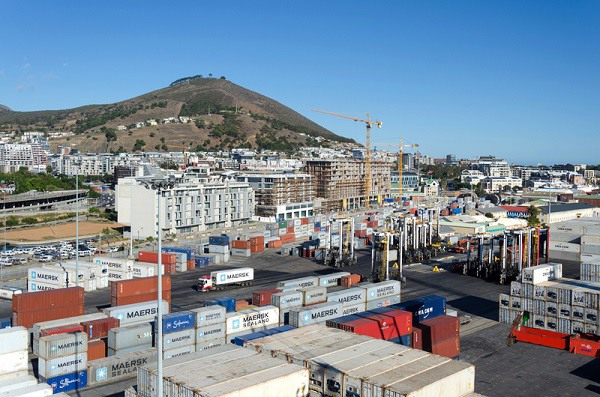 Signal Hill and containers, Cape Town (copyright: Druid007 Dreamstime.com)
Signal Hill and containers, Cape Town (copyright: Druid007 Dreamstime.com)
Suspension of Far East bookings on certain lines for coming month
A very high percentage of the reefer containers that carry South African fruit, are positioned here empty.
“If you’re a shipping line, you’re going to be giving priority to the trade that uses your containers both ways,” Andy Connell, logistics consultant and trainer, says. “We’ve been warned about that in South Africa for many years but certainly with what we’ve been experiencing over the last eighteen months, that bell has been ringing from orange to red.”
It’s the trades to the Middle and the Far East that are really feeling the pressure, consequently the schedule to the Middle East is severely delayed. Freight forwarders tell of their difficulties in both finding containers plus space on these routes.
One freight forwarder says they’re currently not able to load 17% of their cargo each week, which remains behind in cold stores and rolls over to the next week.
Some lines have gone as far as suspending bookings to the Far East for the next four weeks.
Berthing congestion at Cape Town
The MOL Endowment now berthed in the Cape Town Container Terminal on the Asia-South Africa Service has been at the port for 18 days. Its companion on berth, Maersk’s Santa Teresa, already arrived ten days ago. Other vessels have been there for longer than ten days.
“At Maersk we have not had any vessels that had planned to reposition empty reefers, bypass Cape Town,” Maersk states. “Currently, for Maersk ex Cape Town, there have been no omissions on the South Africa – Europe export service, whilst some delays have been experienced on both the North America and Middle East export services. There has been a weekly departure for the majority of the weeks year to date in 2021.”
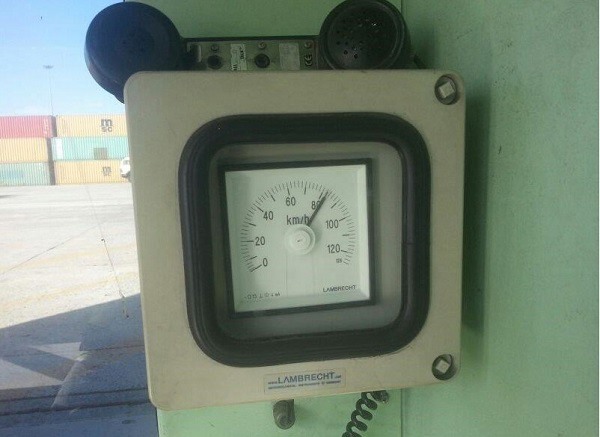 An anemometer on a gantry crane in the Port of Cape Town, measuring a wind speed of 80 km/h at which point the crane shut down (photo by Andy Connell)
An anemometer on a gantry crane in the Port of Cape Town, measuring a wind speed of 80 km/h at which point the crane shut down (photo by Andy Connell)
It is another windy season, a generally troublesome element, causing more stoppages than during the two previous years, some say (although the impact that can be ascribed purely to wind is contested) and coupled with too few containers being made available, grapes for steri markets are amassing in the Western Cape’s cold stores.
In the Hex River Valley the Hexkoel cold storage facility has just re-imposed a quota of a thousand pallets on grape growers, an unprecedented state of affairs.
Recurrent waves of disruption expected throughout the season
The situation may improve, but container shortages and roll-over of cargo is expected be a recurrent feature for the rest of this season and the next.
In South Africa’s case it is aggravated by alleged operational inefficiencies at state-owned Transnet Port Terminals (South African ports operate below African standards, it’s often claimed) and ageing port equipment that ought to be replaced, but after the Zuma years the public purse is empty.
There is a backlog in container repairs and inspection, with complaints about the turnaround time of containers and a “lethargic” approach to container repair at depots.
In last week’s Freight News, Mike Walwyn (director of maritime affairs at the South African Association of Freight Forwarders) recounts a recent incident when the offer by truck companies to pump the rubber tyres of the gantry cranes at the Cape Town Container Terminal, of which half were flat and therefore not operational, was not accepted by port authorities because of a process that requires putting the job of inflating the tyres out to tender.
He also expresses his concern regarding ongoing maintenance at the port.
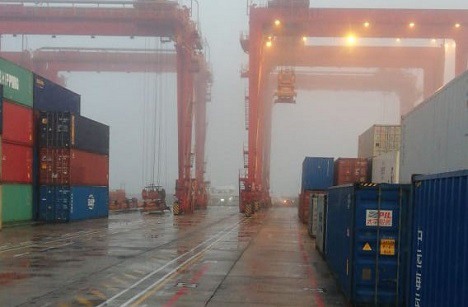 Rubber-tyred gantry cranes at CTCT, seen here during a previous winter rainstorm
Rubber-tyred gantry cranes at CTCT, seen here during a previous winter rainstorm
Andy Connell talks of Transnet’s “total failure to operate ports with any fluidity”. The gross crane moves – 16 to 20 per hour on average, down to below five over the past weekend, back up to over 15 yesterday – are hampered by poor coordination impeding the ability to deliver export boxes in the right flow.
Transnet Ports Terminal terminal manager Oscar Borchards last week told Freight News that the increasingly frequent meetings with the private and public sector had led to a 70% increase in productivity. There is now a greater representation of fruit categories at these meetings with Transnet, a development which is welcomed by the industry.
“We’ve brought more reefers than last year or the year before” Ahmed Hassan, head of Africa Liner Operations for Maersk’s African operations (right), denies that Maersk has reduced the number of reefers to South Africa; in fact, he says they have brought in more reefer equipment every year since 2019 to keep track with the predicted growth of their customers' cargo and they are increasing their market share in South Africa.
Ahmed Hassan, head of Africa Liner Operations for Maersk’s African operations (right), denies that Maersk has reduced the number of reefers to South Africa; in fact, he says they have brought in more reefer equipment every year since 2019 to keep track with the predicted growth of their customers' cargo and they are increasing their market share in South Africa.
“Currently, Maersk has enough equipment in South Africa to carry three weeks of exports,” he says. “We are able to bring in containers as needed by our customers.”
The bottlenecks at the cold stores he ascribes to the increased stoppages due to wind in Cape Town this season, forcing long waits on vessels, some of whom – like the Maersk Amazon about a month ago – eventually (11 days later in this case) resume their journey without entering port.
There is no reason to fear a strategic withdrawal by the Danish company from the South African fruit industry, he says. “During the grape season since end-November until end-March we will carry a lot more boxes than we carried last year. We will see double-digit growth in the reefers that we’re carrying due to the growth in grape volumes.”
The grape season has traditionally been a lower-activity period before citrus starts, but new late grape cultivars are increasing in volume and pushing the season later.
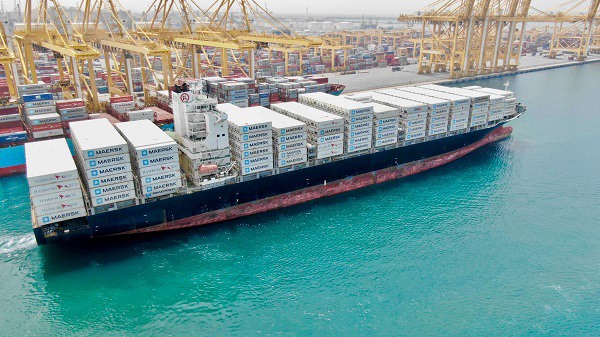 Photo supplied by Maersk
Photo supplied by Maersk
Three more Maersk vessels are planned to bring reefer equipment into various South African ports over the next few weeks. “This is part of the continuous reefer repositioning plan that is in place to ensure we can serve our customer’s forecasted demand throughout the full year to cover all fruit seasons.”
Long term customers less vulnerable
“The services which were calling South Africa for us during 2020, all of them are calling again with the same ships. From Maersk’s side nothing has been taken out of the schedule and no reefer equipment taken away from SA.”
The company has also already started amassing reefers for the upcoming citrus season based on the volume forecasts they’re receiving from their customers but, he says, “I can assure you we’re not holding back any containers that’s supposed to carry grapes by our customers, for the citrus season.”
During the upcoming citrus season they aim to again have coverage from both Port Elizabeth and Ngqura harbours; last year they did it for the first time and it worked well, Ahmed notes.
“I really understand what many of the South African growers are going through in the market. We take a lot of pride in being fruit specialists. We have all the empathy and all the concern, but,” he points out, “If someone has not contracted with us, there’s minimal help we can provide. There’s a finite number of containers available.”
He explains that the recovery of global trade in the third and fourth quarters last year, “created bottlenecks of trade which didn’t exist before as we were trying to push three-quarters of trade through one quarter.”
Shipping lines are charging higher freight tariff on certain destinations – notably North America – because of these bottlenecks, but he maintains that the ability of certain sectors to pay higher freight tariffs doesn’t play a role, “at least not in the way we operate at Maersk”.
“I have not seen any coverage withdrawn from South Africa”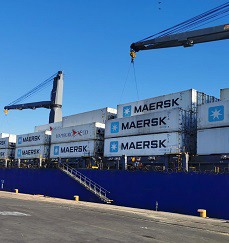 “Customers who have chosen not to take long-term contracts have suffered more than customers who’ve had the mindset of long-term contracts, with as an example of the latter, fast-moving goods and the big retailers on the East-West trades.”
“Customers who have chosen not to take long-term contracts have suffered more than customers who’ve had the mindset of long-term contracts, with as an example of the latter, fast-moving goods and the big retailers on the East-West trades.”
He doesn’t concur with the figure quoted by some in the fruit industry that shipping lines make double on dry goods than on reefer cargo.
“Considering the global picture, I don’t think it’s true,” he says, but concedes it could be the case in specific instances.
He acknowledges tension between the East-West trade, where there’s booming demand, and other trade routes. “Does it affect South Africa more than other countries? In my personal view it would be very difficult to come to that conclusion. South Africa has very good coverage and I have not seen any coverage as Maersk withdrawn from the South African market due to an increased demand on the East-West trade.”
“We take South Africa very seriously, we take fruit very seriously. We really want to make sure that, when the country is in a difficult situation, we help exporters as best we can. That’s what we come to work for every morning.”
